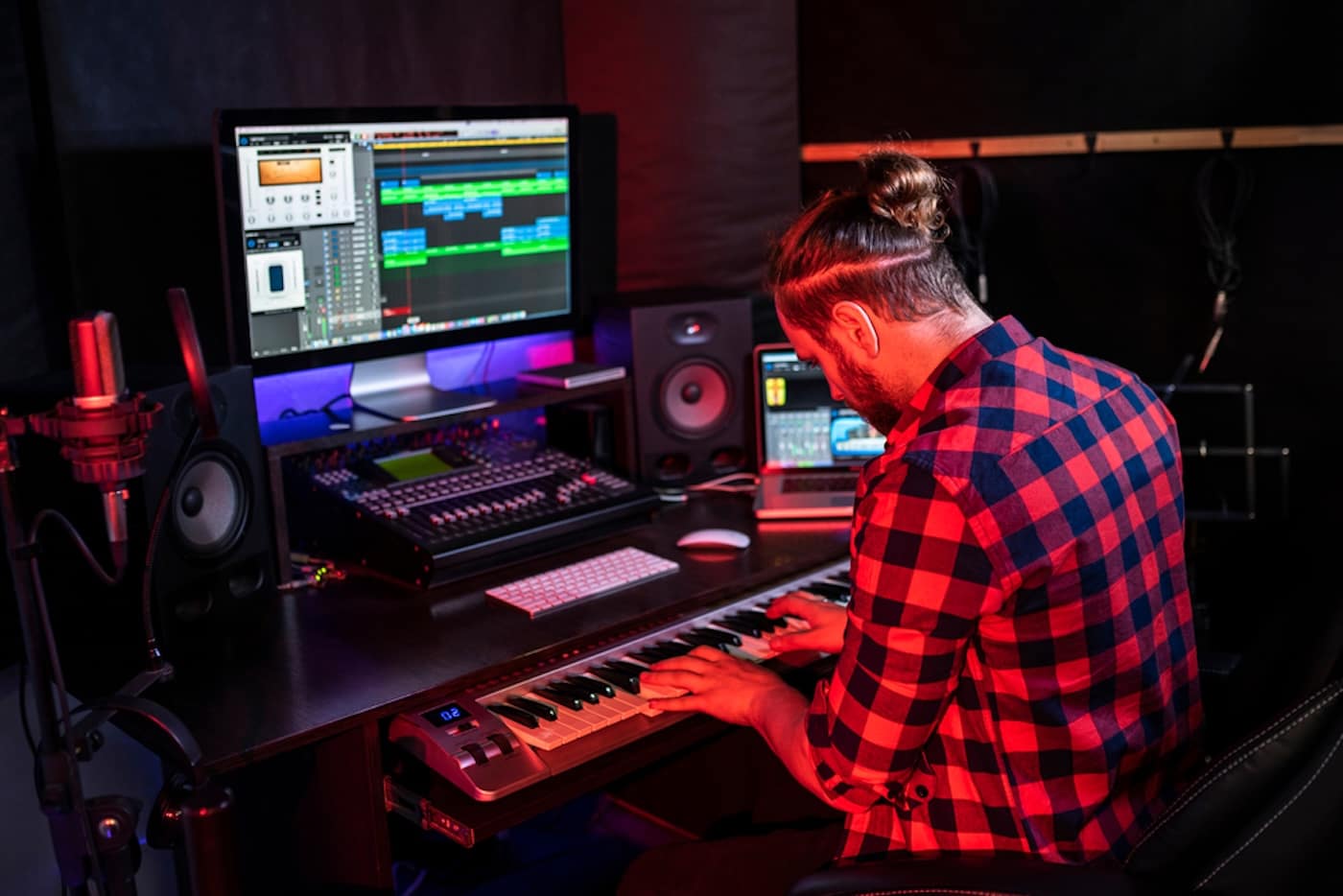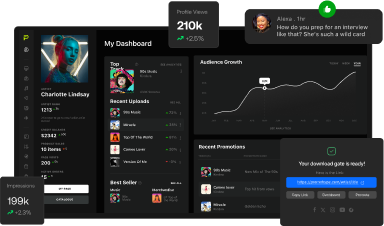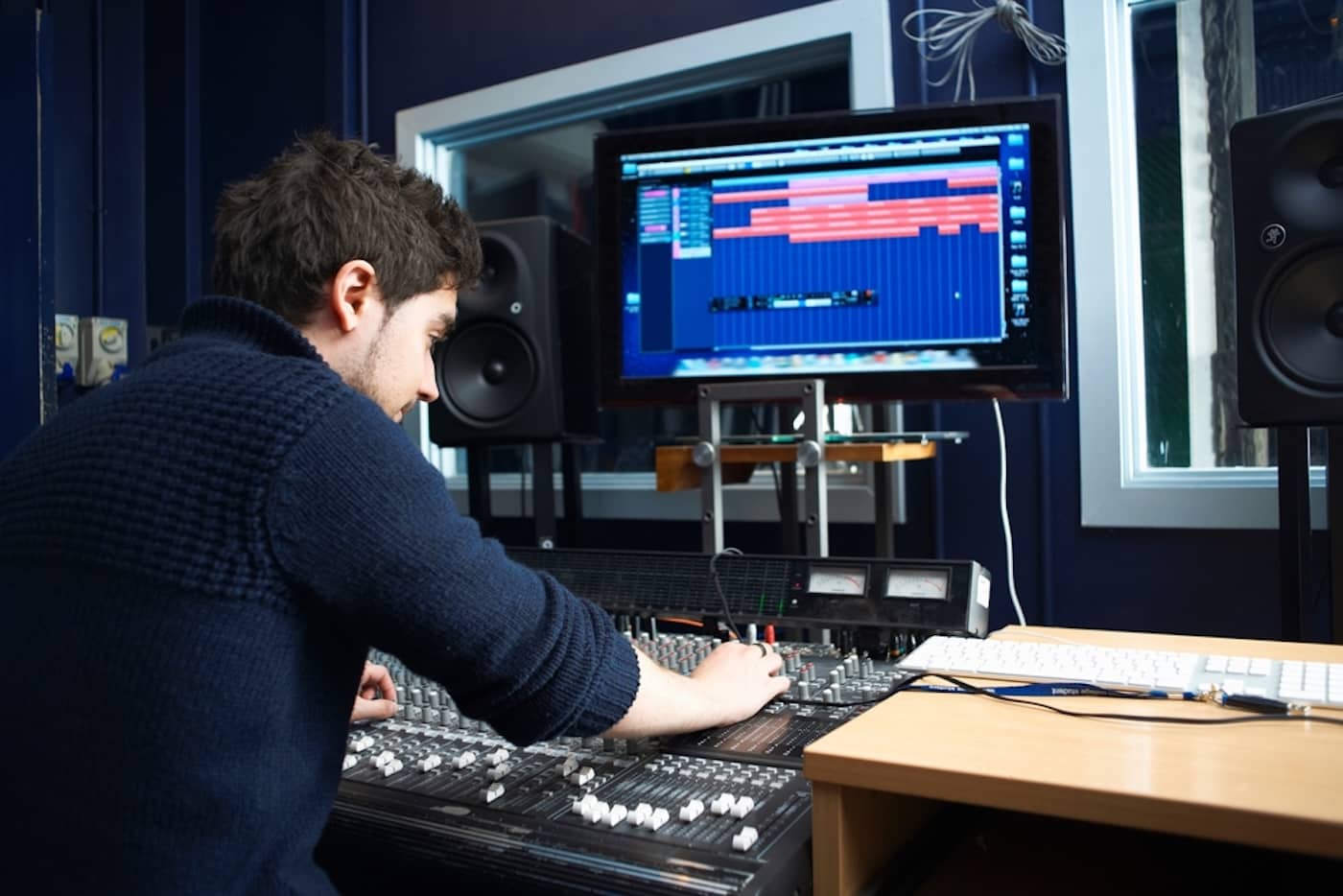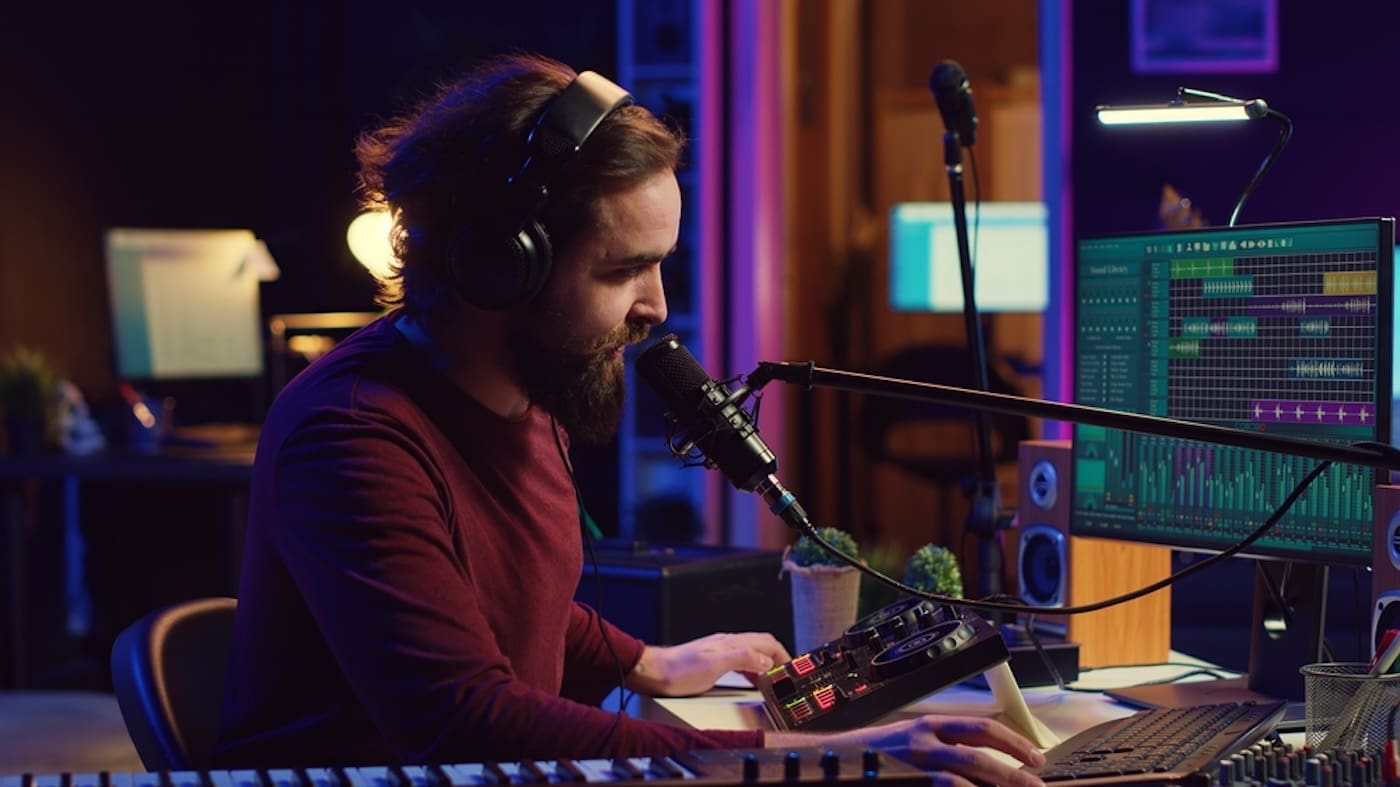
While music is driven by passion, becoming a successful music producer opens up a range of methods to generate income.
Knowing how to make money as a music producer requires an entrepreneurial mindset and identifying opportunities that fit your brand.
With that in mind, we’ve compiled 10 ways that you can make money producing music, from selling sample packs to helping other artists polish their tracks.
Get Early Access
To Promo Hype
What Do Music Producers Do?
The role of a music producer involves a combination of musical creativity, technical know-how, and interpersonal skills.
On the creative side, music producers shape the tone and style of the song, applying production and sound engineering techniques.
This is complemented by an ability to troubleshoot technical issues, from computer issues to ensuring the recording studio is optimized.
The music producer is also often involved in managing collaborations, scheduling recording sessions, and liaising with artists.
It’s a diverse skill set that can be challenging to master, but is nevertheless a hugely rewarding and creative experience.
How Much Do Music Producers Make?
The income from producing music varies wildly, based on factors including brand recognition, industry experience, and technical abilities.
In the United States, the average salary for professional music producers is between $50,000 and $70,000 per year.
Entry-level music producers can expect to earn between $30,000 and $40,000 annually, while experts earn upwards of $100,000.
Non-industry music producers can still earn money through a range of means, including mechanical royalties and performance royalties.
If you’re becoming a music producer, understanding these sources can help you prioritize your choices and maximize your income.
Read more: The 10 Best DAWS.
How to Make Money as a Music Producer in 2025
We’ve covered the potential income range and average earnings of music producers at different stages of their journey.
Let’s explore how to make money as a music producer, from using your own music to generate revenue to other viable revenue streams.
10. License Your Music
Whenever you recognize a track in advertisements, TV shows, or movies, chances are it’s the result of music synchronization licensing.
Often abbreviated to sync licenses, this occurs when the copyright owner licenses a specific composition for use in visual media.
To generate income from sync licenses, producers must partner with music production libraries or licensing agencies.
It’s also essential to learn how to trademark a band name and protect your brand from potential copyright infringements.
In addition to TV and movie licensing, institutions like ASCAP also help restaurants, gyms, and other facilities acquire music licensing permits.
While some restaurants and bars have complained about rising music licensing costs, it remains a viable option for music production income.
9. Hire Out Your Home Studio
While some producers work out of a spare room, others dedicate time and money to building a home recording studio.
If that’s you, your studio can become another revenue stream by hiring it out for artist and band recording sessions.
You’ll need to be familiar with the recording process, providing technical support, and helping with scheduling sessions.
If you’re just starting, consider reaching out to local musicians you know and holding practice recording sessions to get comfortable with the process.
This will help you to iron out the workflow and determine appropriate hourly rates for hiring out the recording studio to clients.
It’s an excellent way to bring in money as a music producer, while also honing your ability to record music like a professional.
8. Monetize Your YouTube Channel
Setting up a YouTube channel is a tried-and-true method for music producers to build their brand and promote their music.
It’s also a solid platform for earning money, once your channel has passed the 1000-subscriber threshold for monetization.
With YouTube cracking down on mass-produced content, it’s a great time to use your channel to showcase high-quality content.
This content can include anything from music production tips to behind-the-scenes videos that share your life as a producer.
A YouTube channel also opens up other monetization opportunities, from sponsored content to sales of merchandise.
It’s also tailor-made for sharing visual media, allowing the record producer to push videos and images that reflect their brand.
You can link up your YouTube channel with other external websites, building a network of interconnected revenue streams.
Learn more: The 10 Best Free VST Plugins.
7. Perform Live Gigs
Music producers who know how to write a song and perform it to an audience have long been using live gigs as a way to earn money.
If you know how to play instruments, these live performances can range from solo shows to collaborating with other acts.
Alternatively, electronic music producers can use some music production software, such as Ableton Live, in their live shows.
There are many ways to get gigs as a musician, from putting on events with other musicians to sending demos to local venues.
You can also attend other gigs to build networks with event organizers, establishing a rapport with staff and promoters.
While gigging for free is great for initial exposure, if you can draw in a crowd, you can establish rates commensurate with your efforts.
With many opportunities in the live music industry, it’s an excellent way to sell merchandise and strengthen your reputation.
6. Sell Instrumentals & Beats Online
Selling beats and instrumentals online has long been a reliable and consistent source of income for music producers.
While it’s a competitive marketplace, producers with the necessary skills and home studio setup can capitalize on demand.
Most producers use a combination of paid and their own samples for audio editing, helping them to create great music.
You can sell online through music marketplaces like Beatstars, Airbut, and Sellfy, each with its own rates and community support.
There are no limitations on the type of sample packs you sell, from percussion and synths to science fiction experimental sounds.
The income for selling beats and instrumentals varies, ranging from around $100 per month up to over $1000 for committed producers.
If you’re a producer who enjoys spending time building loops, chord progressions, and sounds, it’s worth considering sample packs.
Get Early Access
To Promo Hype
5. Tutor Other Producers
If you’re a music producer with a deep knowledge of production and technical skills, you can offer tutoring services to earn money.
Many music producers supplement their income in this way, with no shortage of aspiring producers in search of lessons.
You can take a broad approach to music theory for producers, or hone in on specific processes that play to your strengths.
This could include deep dives into MIDI interfaces or tutoring that focuses on production techniques for niche music genres.
If you’re familiar with traditional music theory, you can offer lessons that explore concepts such as the circle of fifths.
You can use your interactions with your students to brainstorm other aspects of producing music that you may be unfamiliar with.
If you have studio recording facilities, your tutoring side gig can use these resources to give students a hands-on learning approach.
4. Offer Production Services For Artists
Taking things to the next level, from hiring out a home studio, is offering complete musical assistance and production services.
This takes the recording process and expands it with assistance on arranging, editing, and mixing entire tracks for clients.
Many successful independent artists use external producers, accessing their knowledge and focusing on songwriting.
The process begins with discussions around the intended genre, tone, and structure of the track, sometimes using a song structure template.
Any specific instruments used when making music will be detailed, along with other desired elements that shape the overall sound.
Once you build up a portfolio of completed projects, you can use this when seeking out a publishing deal for your own music.
3. Provide Mixing & Mastering Services
If you’d prefer to avoid dedicating time to complete music production services, you can offer mixing and mastering services to other artists.
Such services include skills such as sound design and gain staging, using the appropriate tools to mix music professionally.
A strong familiarity and track record in mixing and mastering are essential, with a portfolio of work for previous clients highly recommended.
This experience and experience will impact your rates, with many music producers charging between $50 and $500 per track.
When determining your rates, you should also factor in the time you expect each project to take and any investments in dedicated gear.
Related: Learn how to use audio compression.
2. Sell Physical & Digital Releases
Selling physical CDs and vinyl records has long been a reliable source of income for music producers across all genres.
While streaming services tend to dominate listening habits, the market for traditional physical media remains healthy.
You don’t have to be signed to a record label to sell physical media, provided you have the initial outlay for a limited print run.
Indeed, selling limited edition versions of albums can be a lucrative sideline, provided you have a strong enough following willing to invest.
If you’re confident in the quality of your music, you can seek out record labels looking for artists who release similar music.
Whichever approach to music publishing you take, you can promote your work online and use it to attract interest from the music industry.
1. Generate Revenue From Streaming Royalties
With music streaming services capturing a significant portion of music fans’ attention, it’s a no-brainer to hit these platforms.
Spotify, TIDAL, Apple Music, and others each allow artists to collect music royalties for tracks played across all popular music genres.
One of the biggest appeals to generating revenue from streaming services is its relatively hands-off approach.
Once your music has been added to these services, you can concentrate on building an audience looking to hear your work.
Furthermore, there are music distribution services that can streamline the entire process and save even more time and effort.
Their services include scheduling and uploading across all platforms, with tools for promotional initiatives and data analytics.
This ensures your streaming royalties are fully optimized across all sources, freeing up your time to focus on music production.
Read next: Find out how to submit music to radio stations.
Tips For Increasing Your Income As A Producer
Earning an income through music production can take time to get off the ground, particularly if you lack a strong social media presence.
Here are some steps you can take to increase your income as a music producer and generate a reliable source of income:
- Set up a professional website: Creating a strong first impression is vital for picking up lucrative deals that swell your bank account. A professional website can also be used to host online courses and information about your mixing and mastering skills.
- Network in the music business: Networking is a key activity across all entertainment, and producers can build contacts through venues, labels, and other artists. The more contacts you make, the greater your chances of discovering new and exciting opportunities to earn money.
- Stay abreast of industry trends: Understanding how the music industry is evolving is something many producers use to their advantage. Whether you’re reviewing the latest music production equipment or trending genres, this information can help you stay current and relevant.
- Diversify your income streams: With no limitations on the sources of income you can bring in, diversification is key to success. Consider branching into new domains, whether it’s producing video game music or experimenting with music licensing.
- Use all social media channels: Social media’s dominance of online life has made it invaluable for producers looking to gain exposure. While going viral on TikTok may be challenging, social media should play a significant role in your promotional activities.
By combining digital streams with live shows and music-producing services, you can build up a diverse income stream over time.
Summary
Earning money as a music producer doesn’t require a record label deal, with plenty of options available to independent artists.
It can come from a range of sources, from selling music online to hiring out facilities and providing production services.
By choosing the streams that match your resources and skills, you can establish a reputation that results in consistent income.
Get Early Access
To Promo Hype
Join Promo Hype






